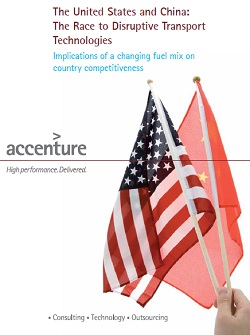 As Chinese President Hu Jintao wraps up his visit to the United States, a new report details how America can use biofuels to compete in the alternative energy field for vehicles.
As Chinese President Hu Jintao wraps up his visit to the United States, a new report details how America can use biofuels to compete in the alternative energy field for vehicles.
This article on CNET.com says the Accenture report, entitled “The US and China: The Race to Disruptive Transport Technologies,” says the Chinese have a decided edge in government commitment to electric vehicles ($10 billion over the next 10 years to the EV industry alone) and rich deposits of lithium, a key ingredient in EV batteries. But American biofuels could be the great equalizer:
So what does the U.S. have to compete against China’s lithium, money, and government control? To put it succinctly: brainpower, strong intellectual property laws, and agricultural expertise.
The Accenture report predicts that rather than one alternative fuel reigning supreme, the world will see an increase in transport fuel diversity.
Unlike China, the U.S. has strong intellectual property laws and a record of upholding and protecting intellectual property rights, which encourages private investment in research and development, something the report says has a direct effect on innovation.
Biofuels are a good illustration of that point. The U.S. currently has a strong biotechnology industry that is improving biomass and biofuels technology and is developing a proven track record of success. It’s leading to lucrative licensing of the technology, expansion of U.S. biotech companies, and international investment from foreign companies, according to Accenture.
The U.S. also happens to be the largest producer of corn in the world with an estimated 30 percent of its yield going into ethanol production. Yield improvements and domestic surpluses are even expected to rise in coming years due to recent agricultural innovations.
The article goes on to say that the U.S. is more diverse in its biofuels package, including biodiesel made from diverse feedstocks, such as algae. China seems to be focusing on cellulosic ethanol to replace gasoline.

